
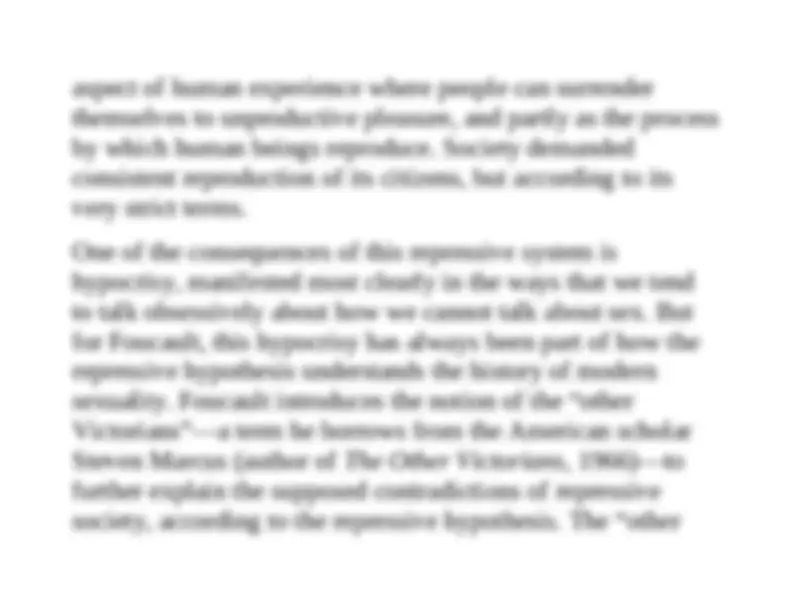
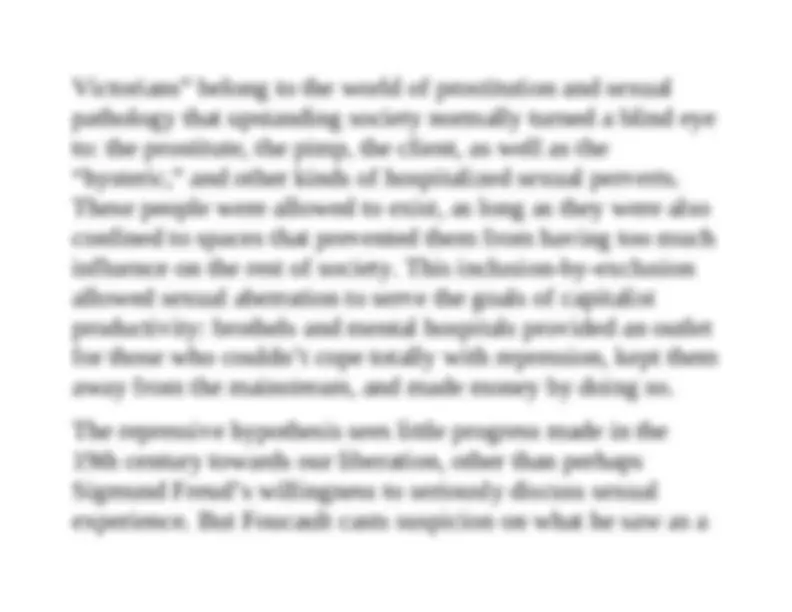
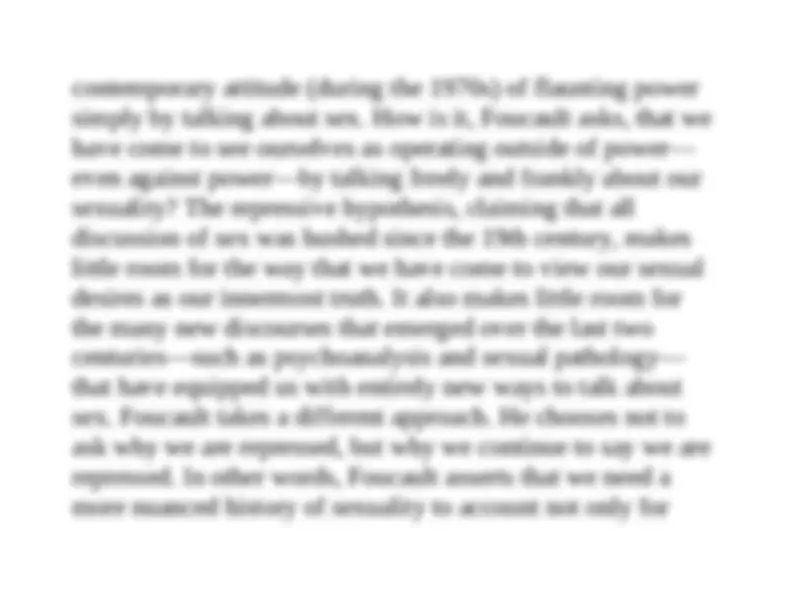
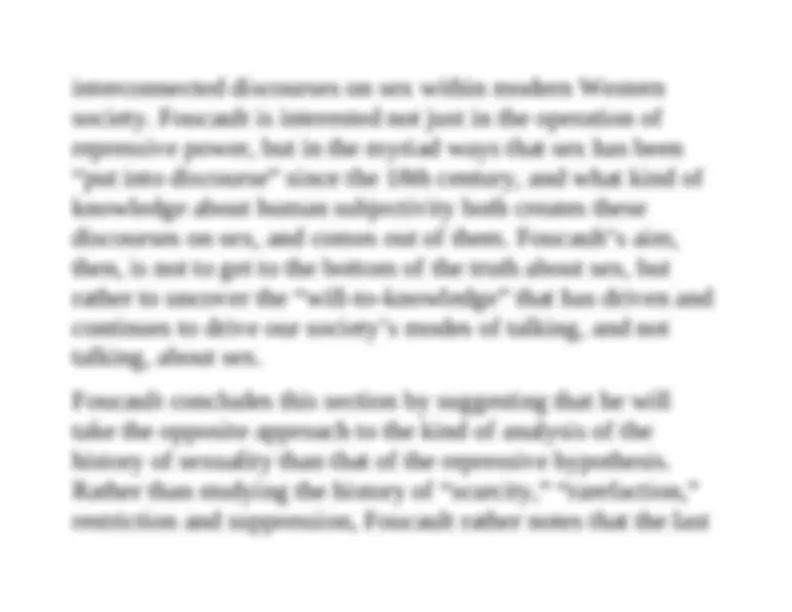
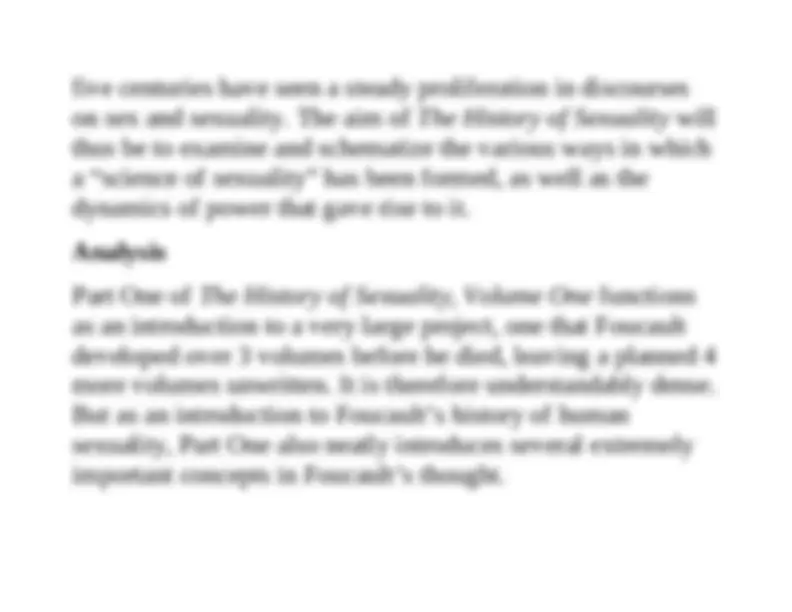
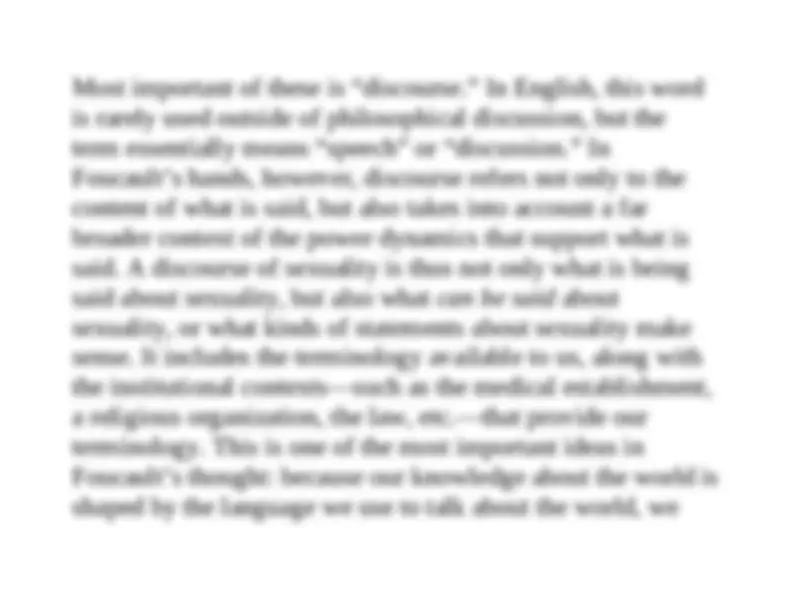
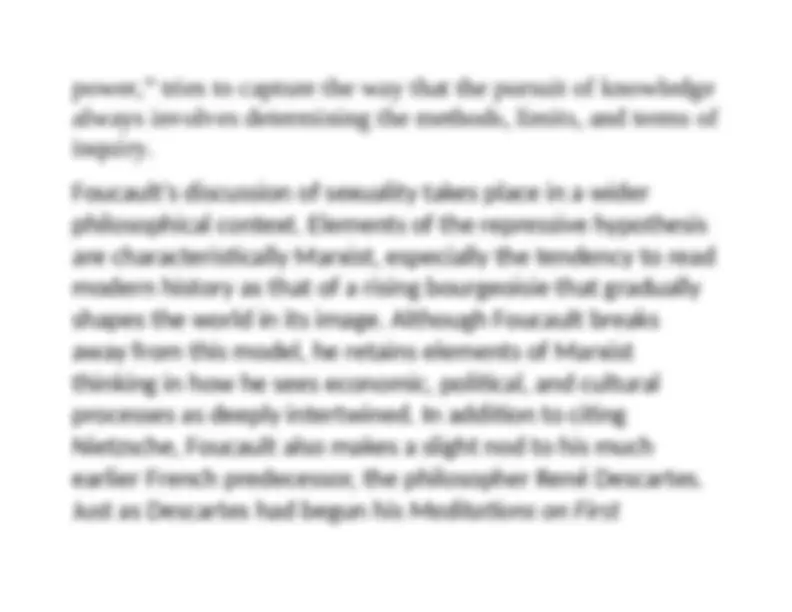
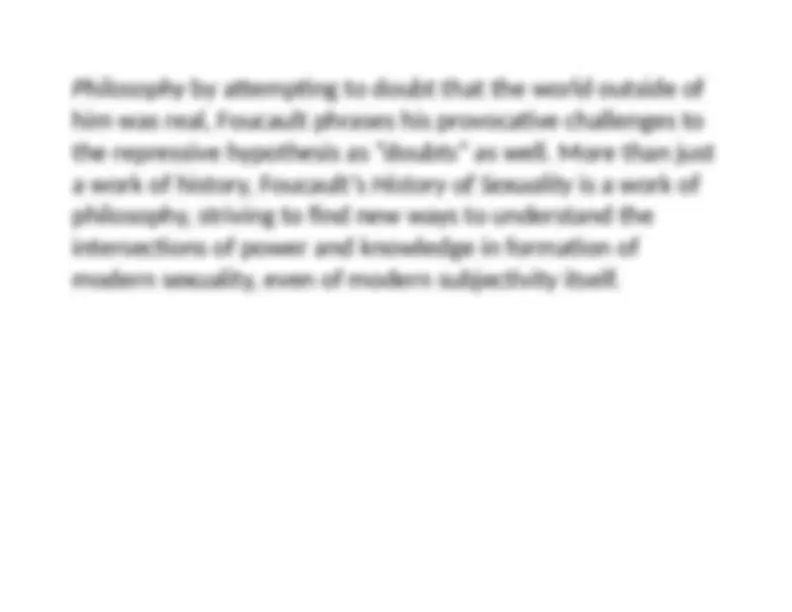


Study with the several resources on Docsity

Earn points by helping other students or get them with a premium plan


Prepare for your exams
Study with the several resources on Docsity

Earn points to download
Earn points by helping other students or get them with a premium plan
Community
Ask the community for help and clear up your study doubts
Discover the best universities in your country according to Docsity users
Free resources
Download our free guides on studying techniques, anxiety management strategies, and thesis advice from Docsity tutors
A summary and analysis of part 1: 'we other victorians' from Michel Foucault's 'The History of Sexuality, Volume 1'. Foucault challenges the 'repressive hypothesis' and introduces the concept of the 'other Victorians'. He argues for a more nuanced history of sexuality, exploring the 'will-to-knowledge' that drives our society's modes of talking and not talking about sex. The document also explores Foucault's key concepts of discourse, power, and knowledge, and situates his work within the wider philosophical context.
Typology: Lecture notes
1 / 14

This page cannot be seen from the preview
Don't miss anything!









The History of Sexuality, Vol. 1 Summary and Analysis of Part 1: We Other Victorians Summary Foucault begins his study by presenting what he calls the “repressive hypothesis” of the history of sexuality. The repressive hypothesis is the idea that what we would conventionally call modernity (roughly the 18th century through today) is characterized by a widespread societal repression of sexuality. Even today, Foucault argues, we believe that we struggle to liberate ourselves from the norms of a European bourgeoisie that confined acceptable expressions of sexuality to the parental marriage-bed, and that struggled to make all open discussion of sexuality disappear. Given a timeframe that stretches as far back as the 18th
century, sometimes even the 15th, Foucault uses the term “Victorian” more as a way of invoking a period firmly linked with bourgeois prudishness and sexual repression in our imagination: 19th century England, remembered as a time of conservative dress, serious manners, and stiff sexual morality. In Foucault’s view, the repressive hypothesis is a sociological argument. It is based on the notion that the repression of sexuality accompanies the rise of an increasingly industrial bourgeoisie anxious to control and shepherd the expenditure of human energy and human productivity. As bourgeois society achieves a tighter and tighter control over the life of its subjects, argues the repressive hypothesis, this society also finds it important to control forms of productivity beyond the traditional economic domain—including human reproduction. Sex thus comes under bourgeois repression in part as an
Victorians” belong to the world of prostitution and sexual pathology that upstanding society normally turned a blind eye to: the prostitute, the pimp, the client, as well as the “hysteric,” and other kinds of hospitalized sexual perverts. These people were allowed to exist, as long as they were also confined to spaces that prevented them from having too much influence on the rest of society. This inclusion-by-exclusion allowed sexual aberration to serve the goals of capitalist productivity: brothels and mental hospitals provided an outlet for those who couldn’t cope totally with repression, kept them away from the mainstream, and made money by doing so. The repressive hypothesis sees little progress made in the 19th century towards our liberation, other than perhaps Sigmund Freud’s willingness to seriously discuss sexual experience. But Foucault casts suspicion on what he saw as a
contemporary attitude (during the 1970s) of flaunting power simply by talking about sex. How is it, Foucault asks, that we have come to see ourselves as operating outside of power— even against power—by talking freely and frankly about our sexuality? The repressive hypothesis, claiming that all discussion of sex was hushed since the 19th century, makes little room for the way that we have come to view our sexual desires as our innermost truth. It also makes little room for the many new discourses that emerged over the last two centuries—such as psychoanalysis and sexual pathology— that have equipped us with entirely new ways to talk about sex. Foucault takes a different approach. He chooses not to ask why we are repressed, but why we continue to say we are repressed. In other words, Foucault asserts that we need a more nuanced history of sexuality to account not only for
something that does not necessarily express itself primarily as repression?
interconnected discourses on sex within modern Western society. Foucault is interested not just in the operation of repressive power, but in the myriad ways that sex has been “put into discourse” since the 18th century, and what kind of knowledge about human subjectivity both creates these discourses on sex, and comes out of them. Foucault’s aim, then, is not to get to the bottom of the truth about sex, but rather to uncover the “will-to-knowledge” that has driven and continues to drive our society’s modes of talking, and not talking, about sex. Foucault concludes this section by suggesting that he will take the opposite approach to the kind of analysis of the history of sexuality than that of the repressive hypothesis. Rather than studying the history of “scarcity,” “rarefaction,” restriction and suppression, Foucault rather notes that the last
Most important of these is “discourse.” In English, this word is rarely used outside of philosophical discussion, but the term essentially means “speech” or “discussion.” In Foucault’s hands, however, discourse refers not only to the content of what is said, but also takes into account a far broader context of the power dynamics that support what is said. A discourse of sexuality is thus not only what is being said about sexuality, but also what can be said about sexuality, or what kinds of statements about sexuality make sense. It includes the terminology available to us, along with the institutional contexts—such as the medical establishment, a religious organization, the law, etc.—that provide our terminology. This is one of the most important ideas in Foucault’s thought: because our knowledge about the world is shaped by the language we use to talk about the world, we
need to study the ways that power expresses itself by shaping and influencing language. A discourse can take many forms, and can be either narrow or very wide in scope. As we will see throughout this book, the discourse of sexuality draws from a complex intertwining of medical, religious, economic, and scientific approaches to, and attitudes about, how things should be. The world as we experience it, in Foucault’s view, is a world of discourses. Another closely related term is thus “knowledge-power.” The motivational posters you've seen in your high-school classrooms had it right: knowledge is power—especially for Foucault. But here we have to be a little careful. While Foucault is adamant that the repressive hypothesis does not tell us the whole story of human sexuality, the whole point of The History of Sexuality is to examine how modern forms of
power,” tries to capture the way that the pursuit of knowledge always involves determining the methods, limits, and terms of inquiry. Foucault’s discussion of sexuality takes place in a wider philosophical context. Elements of the repressive hypothesis are characteristically Marxist, especially the tendency to read modern history as that of a rising bourgeoisie that gradually shapes the world in its image. Although Foucault breaks away from this model, he retains elements of Marxist thinking in how he sees economic, political, and cultural processes as deeply intertwined. In addition to citing Nietzsche, Foucault also makes a slight nod to his much earlier French predecessor, the philosopher René Descartes. Just as Descartes had begun his Meditations on First
Philosophy by attempting to doubt that the world outside of him was real, Foucault phrases his provocative challenges to the repressive hypothesis as “doubts” as well. More than just a work of history, Foucault’s History of Sexuality is a work of philosophy, striving to find new ways to understand the intersections of power and knowledge in formation of modern sexuality, even of modern subjectivity itself.